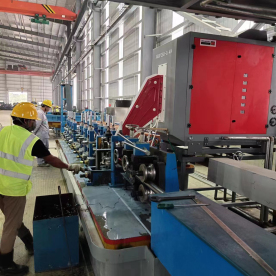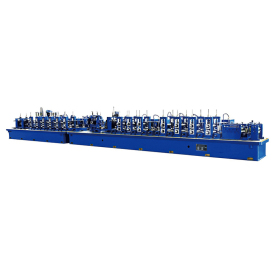[Stainless Steel Pipe making machine]Understanding the Role and Functionality of Stainless Steel Pipe Making Machines in Modern Manufacturing Industries
News 2024-12-5
Stainless steel is a crucial material in many industrial applications due to its strength, durability, and resistance to corrosion. This metal is widely used in various industries, including construction, automotive, aerospace, and food processing, which demand high-quality piping systems. To meet the growing demand for stainless steel products, manufacturers have turned to advanced technology and machinery. One such essential piece of equipment is the stainless steel pipe making machine. This article explores the functionality, importance, and technological advancements of this vital machinery in the stainless steel pipe production process.
Overview of Stainless Steel Pipe Making Machines
Stainless steel pipe making machines are specialized equipment designed to manufacture stainless steel pipes of various diameters and wall thicknesses. The pipes produced by these machines have applications in plumbing, heating, ventilation, air conditioning (HVAC), and even the medical field. The manufacturing process typically involves several key steps, including coil feeding, forming, welding, sizing, and cutting.
The Manufacturing Process
1. **Coil Feeding**: The process generally starts with feeding stainless steel coils into the machine. These coils are made from stainless steel sheets, which are rolled into flat strips.

Understanding the Role and Functionality of Stainless Steel Pipe Making Machines in Modern Manufacturing Industries
3. **Welding**: One of the most critical steps in the production of stainless steel pipes is the welding process. Once the strip is formed into a tube, it needs to be welded to secure its shape. Depending on the machine and the application, methods such as high-frequency electric resistance welding (ERW) or laser welding are employed. This step is crucial for ensuring the integrity and strength of the weld joint.
4. **Sizing**: After welding, the newly formed pipe goes through a sizing section where it is calibrated to achieve the desired diameter and wall thickness. This ensures that the final product adheres to industry standards and specifications.
5. **Cutting**: Finally, the pipes are cut to the required lengths. This is typically done using high-precision cutting devices that ensure uniformity and minimize material wastage.
Importance in Various Industries
Stainless steel pipe making machines play a vital role in various industries. Their ability to produce high quantities of pipes efficiently makes them indispensable in sectors where quick turnaround and reliability are paramount. For example:
- **Construction**: Stainless steel pipes are widely used in both residential and commercial construction for plumbing and structural applications due to their resistance to corrosion and aesthetic appeal.
- **Automotive and Aerospace**: The aerospace and automotive sectors require lightweight yet strong materials for fuel lines, exhaust systems, and other critical components. Stainless steel pipes fulfill these requirements excellently.

Understanding the Role and Functionality of Stainless Steel Pipe Making Machines in Modern Manufacturing Industries

Understanding the Role and Functionality of Stainless Steel Pipe Making Machines in Modern Manufacturing Industries
Technological Advancements
The design and functionality of stainless steel pipe making machines have evolved significantly over the years. Modern machines are equipped with advanced features such as computerized controls, real-time monitoring systems, and automation capabilities. These enhancements optimize production processes, reduce labor costs, and improve product quality.
Furthermore, manufacturers are increasingly adopting eco-friendly practices, such as energy-efficient machinery and recycling waste materials generated during production. This focus on sustainability is expected to grow, reflecting the broader trends within manufacturing industries worldwide.
Conclusion
In summary, stainless steel pipe making machines are essential to modern manufacturing, serving a diverse array of industries. Their ability to produce high-quality, durable pipes plays a crucial role in meeting the demands of various sectors, from construction to food processing. As technology advances, these machines continue to become more efficient and environmentally friendly, ensuring their relevance in the industry. Manufacturers looking to invest in stainless steel production technology should consider the capabilities and advancements in pipe making machines to enhance their production processes and maintain competitive advantages.
